- Home
- Jennifer Crusie
Dogs and Goddesses Page 6
Dogs and Goddesses Read online
Page 6
“Tell me about it,” Daisy said. “Bea would have loved me getting together with a musician; that was just her style. It was horrible that she died, but at least she went boinking.”
Abby straightened. “My mother said … She had a heart attack, I thought.”
“Um.” Daisy hesitated, then shrugged. “Yeah. She just had it while she was straddling Mr. Casey. From Casey’s Hardware, down the street?”
“Good God.” No wonder her mother hadn’t wanted her anywhere near Bea. The Real Estate Goddess of Escondido never lifted her skirts for anyone less than a millionaire. Abby wiped her hands on her apron, then picked up her heart cutter. “You know what? We’re going to do this.”
“Really?”
“Yup.” Abby cut out another cookie, then admired it. “I mean, if Granny B would have gotten you laid, then it’s my obligation to see it through.”
Daisy’s face lit up. “Oh, that’s great! I have to tell you, though, I don’t usually get like this over a man. I think I might be a little bit drunk.”
Abby laughed. “Well, I don’t usually bake. Or fight with math professors. I think it’s just been one of those days.”
“It’s been a good day,” Daisy said. “I’m gonna go get Bailey and print out some flyers to put around town. You need any help baking?”
Abby shook her head. “I’ve got this under control. I’m actually having fun. I might try some new recipes, see what I like. But tomorrow, if you could help me clean—”
“Oh, absolutely! I’ll take a half day. They owe me the time, trust me.”
Somebody knocked on the front door to the coffeehouse.
“You want me to get that?” Daisy asked.
Abby shook her head. “I’ll take care of it. You go on to bed.”
She switched the light on as she walked through the deserted shop, brushing the flour off her hands. Bowser had abandoned his bone and was sticking by her side. She was perfectly safe. Whoever was silhouetted in the glass door, making such a fuss, wouldn’t have a chance against a behemoth such as Bowser—
She slowed as she recognized who it was.
“Good,” Bowser growled.
“I don’t think so,” Abby said, and opened the door to Professor Christopher Mackenzie.
FOUR
Professor Mackenzie had shed his jacket and tie. His white shirt was open at the collar, the sleeves rolled up, and his hair was rumpled as if he’d been shoving his hand through it in exasperation.
“What are you doing here?” Abby said, ignoring the odd, tight, fluttery feeling in the pit of her stomach when she looked at him.
He had the grace to look slightly uncomfortable. “I wanted to make sure you were actually going to bake cookies for the reception. And there were several dietary restrictions I neglected to mention.”
She crossed her arms over the apron, and she could feel the sparkle and bows. She was Granny B’s granddaughter; she wasn’t going to let herself be intimidated by a stranger, no matter how good-looking. “You’re a control freak, aren’t you, Professor?” she said mildly. “Don’t you have more important things to do than chase around after cookies? Life would be a lot simpler if you’d just ordered them from a bakery and didn’t worry about the tiny bit of money you’d given Granny B.”
“Two hundred dollars,” he said.
“Two hundred?” she echoed. “They must have been some cookies.”
“Your grandmother’s prowess was legendary.”
She’d already heard a great deal about her grandmother’s legendary prowess. “I never really knew Granny B… .”
“And I’m not about to enlighten you,” he said, looking uncomfortable. “In fact, if you had a cell phone I could have simply called and given you my instructions.”
“I have a cell phone. I just don’t give the number out to strangers. And it’s a little late for instructions, don’t you think? You should have thought of that sooner.”
“I did. I came back earlier and you’d gone out.”
“I went to the dog class.”
“You did?” He looked surprised, and for a moment, quite human. “Your dog doesn’t look like he needs much training.”
Bowser had moved past her to brush up against the professor’s long legs. Mackenzie was wearing jeans now, which should have made him more human. Unfortunately, it also made him more attractive, in a snarly kind of way, especially since he was also absently stroking Bowser’s head and Bowser was looking blissful.
Traitor, Abby thought.
“I don’t like people touching my dog,” she said.
“Mind your own beeswax,” Bowser said.
“Beeswax?” Abby echoed, astonished.
“What about beeswax?” Mackenzie looked confused as he rubbed Bowser’s ears, and the sight of those long fingers was making Abby feel uncomfortably warm. “Your dog came to me. It wasn’t my idea.”
“That’s true,” Bowser rumbled.
Okay, this crazy night was getting even crazier. She needed to get Mackenzie the hell out of there before she became even more unhinged and jumped his bones. Because as annoying as he was, there was something about him that seemed to call to her. “Come here, Bowser!” she said firmly.
Bowser gave her a long-suffering look and shuffled back to her side. “Like him.”
“Did you hear that?” she demanded.
“Hear what?” Mackenzie said, staring at her as if she’d grown a second head. “Don’t tell me you’re hearing voices?”
She certainly wasn’t going to tell him her dog was talking to her. “Of course not. Don’t be ridiculous—why would you think something like that? I’m fine.” She looked up at him. Big mistake. His eyes darkened behind the gold-rimmed glasses, and for a moment she was lost. There was something unfamiliar in the back of his eyes, what she might almost have thought was … attraction. But he’d made it very clear he found her to be nothing more than an annoyance. Still, why had he shown up here with such a feeble excuse?
“Your cookies will be ready by tomorrow night. If you have special dietary requirements, let me know,” she said in her most reasonable voice. “I’m opening the coffeehouse for tomorrow night, and I can switch out the cookies if there’s a problem.”
He looked away, glancing around the barren front room. “Tomorrow? You think you have time for that as well as my cookies? You have delusions of grandeur, Miss Richmond.”
“I’ve never known anyone to be so obsessed with cookies,” she said. “Just let me worry about how I’m going to accomplish all that. Now go away and let me bake.”
He’d opened his mouth to respond when suddenly Bowser knocked against her, unbalancing her so that she stumbled against the professor. He put out his hands to catch her, and for a moment they were too close, close enough for her to feel his body heat—the sensation was disturbing, erotic—and it seemed as if his fingers caressed her arms as they’d caressed Bowser’s head.
Then sanity returned, and she yanked herself away, stumbling a little bit. “Sorry. I’m not usually so clumsy.”
He didn’t move, staring down at her. She was a tall woman, but he was well over six feet of lean muscle, muscle she’d felt when her Newfoundland had shoved her into his arms.
“I’ll be here to pick up the food at six-thirty tomorrow,” he said abruptly.
For a moment she said nothing. She could still feel his hands on her arms, feel the warmth of his body. For some idiotic reason, she wanted to move back, to rest against him, to have him draw her closer.
Yup, she was insane.
And he didn’t seem to be going anywhere. Much as she wanted to believe that the dark expression in his eyes signified instant attraction, she knew better. Something was bothering the uptight professor, and she had no idea what it was.
“Are you sure you’re not hearing voices?” he said. “The only voice I’m hearing is yours and I can do without it,” she said, doing her best to sound reasonable. She didn’t want to touch him again, but he wasn’t moving, so she
gave him a little shove toward the door, trying to ignore that heat that raced up her fingers to infuse her entire body. “Tomorrow, Professor,” she said, giving one last shove out into the street, and then closed the door behind him and locked it.
“He likes you,” Bowser said, trotting along beside her back to the kitchen.
She stopped inside the brightly lit kitchen and gave her dog a stern look. “Listen, I don’t mind hallucinating, I don’t even mind you tripping me up and sending me into his arms, but since you’re in my imagination, you might as well say things that are reasonable. He thinks I’m crazy, he hates me, and I hate him.”
“I wouldn’t count on it,” Bowser said.
“My imagination,” Abby muttered under her breath, heading back for the cookie dough.
And Bowser said nothing at all.
Shar walked down Temple Street with Wolfie pulling on his leash as if demons were after him while she tried to concentrate on important things, like her grandmother’s book. It wasn’t working, not just because of the mind-blowing stone god or the fact that she’d just invited two complete strangers to watch movies at her house—Sure, come on over, I live in the top two stories of the step temple, you’re going to love it—but because Temple Street, the street she’d walked down every day of her life, was suddenly alive with color: the brilliant yellow front of the boutique on the corner, its windows filled with red and orange gauze skirts; Bea’s coffeehouse, with its peeling lavender storefront and hand-lettered CLOSED sign on the door; Casey’s Hardware Store with its placards of blue and silver paint in the window—My god, those blues—the acid green facade of Lionel’s Bar, and even the plain corner market throbbing white behind its baskets of glowing red apples and cool green peppers that seemed to deepen in color as she went by.
Those blues, those blues. She backtracked to Casey’s window, pulling a resistant Wolfie with her. The strips of paint were beautiful, glowing, ultramarine and lapis, sea and sky. Her mother had left the kitchen half-painted when she’d died. Maybe …
“Come on,” Wolfie barked, and absorbed by the color, Shar said absentmindedly, “Just a minute,” and went inside.
Behind the counter, Mr. Casey, who’d been selling paint there since she’d been three, said, “Hello, Shar.”
“I want paint,” Shar said.
“Stone gray or sand beige?” he said.
“Blue,” Shar said. “Blue like the night sky and—”
Mr. Casey pointed toward the paint samples on the wall, and Shar went over and began to pull out strips, the colors so bright they made her heart pound, midnight blues and amber yellows and peppery reds, while Wolfie kept pulling toward the door, growling low in his throat. By the time she was finished, her credit card had a hole in it, Mr. Casey was looking very cheerful, and she was the owner of eighteen gallons of paint to be delivered the next day.
Wolfie yanked her out the door.
She let him drag her home, still dazed by all those colors, and by the street where she lived, by houses she’d seen a million times suddenly fresh and new, and by the streaky sunset glowing down on her as it sank behind her house, sitting squarely at the end of the street. She slowed as she saw her home, staring at it as if for the first time, the top two layers her grandfather had taken from the step temple and moved down the street looking like a stone wedding cake, powerful and brooding now in the dusk. It had been home for her entire life, but now she saw it as a temple, the way it must have been thousands of years ago, and she wondered if a god-king had walked there once, spoken there once, slept there once—
Wolfie barked and jerked on his leash.
She shook her head to get rid of the god, went up the walk, and opened the front door. Wolfie ran inside ahead of her, more frantic than usual, growling and whining as he began to circle through the four square rooms on the first floor, two on each side of the big stone staircase. He ran through the wide arch into the living room on the right, then through the dining room behind it and then left into the kitchen and finally out through her mother’s old bedroom and back into the hall to drop, panting, at her feet, still tense.
“Good job, Wolf, you’re fierce.” Shar patted him and then dropped her keys and bag on the hall table beside the phone where her answering machine had a glowing “3” on it. She sighed and pushed “play” and heard: “This is Doug Essen. I’m gonna drop that paper off at your office tomorrow—”
“It doesn’t matter; Hera is still Greek,” Shar said, and erased his message, feeling annoyed by his whiny baritone. The hell with undergrads who didn’t study.
“Professor Summer, this is Leesa,” a light voice said after the next beep. “Calling back, just like I said. The thing is, I need an extension on my extension because things have come up. You know. Life. So if that’s okay, just leave me a message. Thanks.”
“I don’t know Life. I gave that up for research,” Shar said, and erased her message, trying not to think about how not much had ever come up in her life. If that god-king had shown up during her master’s work, she’d have missed her deadlines, though; she was pretty sure of that.
“Shar, this is Ray,” Ray said after the next beep. “I’ve been thinking about what you said today—”
“Well, that’s a first,” Shar said, and erased his message.
“Listen to me,” Wolfie whined. “Listen to me; this is bad.”
”What?” Shar said absentmindedly, and then it registered—her dog was talking to her—and she looked down at him, stunned. “What?” She took a step back. “What the hell? Are you talking to me?”
He barked at her. It could have been, “Yep!” but it was probably just a bark.
“Wolfie?” She waited for him to say something else, but he ran into the half-painted kitchen—part stone gray, part sand beige, all boring—and began to lap up water, so she followed him in and poured herself another glass of tonic as she thought about her life: complaining students, annoying significant other, talking dog …
She took a drink. Her dog wasn’t talking. The drink was talking; that was what was talking. I just have to get a grip, she told herself, and said to Wolfie, “So how about a movie? I’m thinking something with violence tonight.”
She went into the living room and sorted through the DVDs on the shelf, stopping at Gladiator. A Hero Will Rise, the cover said, and she thought of the god on the wall.
“Maybe this one,” she said to Wolfie as he came waddling out of the kitchen, and Wolfie whined, “That place, that place, it was wrong,” and she dropped the DVD.
“Wolfie?” she said, and he panted up at her, silent again. “Okay, you have to stop doing that. You’re really freaking me out.”
Wolfie sighed and sat down to scratch his ear.
She sipped her drink again. It didn’t taste like alcohol, but it was definitely potent. That had to be the answer: Wolfie was not talking to her; she was drunk.
Well, that was pathetic. Drunk and alone and watching movies and hallucinating that her dog was talking to her. If there was ever a sign that a change was needed …
“I have to get a new life,” she told Wolfie. “So we’re going back to that class on Tuesday so I can see Abby and Daisy again.” And that stone god—
Wolfie barked, “No, it’s bad there!”
Shar put her glass down with a clunk and stared at him. “Okay, just for the record, I know it’s the drink talking. But why are you so upset about the auditorium? You were even getting hit on by a cute dog.”
Wolfie barked, “There’s nothing good there.”
“Not true.” She closed her eyes and remembered the strength in hooded eyes, broad shoulders, flat stomach, massive stone calves. A guy with calves like that wouldn’t leave a message on an answering machine; he’d show up at the door. And there wouldn’t be any damn Taser if she asked for help, either: he’d tear apart anything that worried her; he’d die for—
“Hey!” Wolfie barked.
“Do you mind?” she said to him. “I’m fantasizing here.�
�
She looked back into the dining room where she’d spread her grandmother’s research out on the table. Reams of Mesopotamian goddess research. Shar took another drink and surveyed it all. Her grandmother’s work. But not hers.
“The hell with you, Sharrat,” she said and then hunched a little, almost expecting a thunderbolt to hit her. Her dog was talking to her; thunderbolts from the dead would not be out of the question, especially if the dead was Grandma Sharrat.
Wolfie barked, clear as day, “It’s wrong there.”
So she was projecting her fears onto her dog. Except she wasn’t afraid of the auditorium or Kammani or the god-king—her mind stalled there for a moment—so maybe Wolfie really was talking to her. She took another drink. Oh, well. She’d had much less interesting conversations with infinitely less interesting people. “Let’s forget the movie and make it an early night.”
She patted his silky head and then went through the living room, picking up her bag on the way, and then up the worn stone steps into the smaller top-floor room that had been her bedroom all her life. She put the bottle and the glass on the nightstand and took Ray’s Taser box out of her bag and put it on the nightstand, too—maybe he’ll drop by and I can Taser him by accident and then tell him it’s his own fault for giving me such an insensitive gift—and then she went into the bathroom and changed into her gray flannel pajamas. When she came back, Wolfie was standing beside the bed.
“Up,” he barked.
“You bet.” She picked up his furry, squirmy little black-and-gray body and put him on the bed, and he nosed under the duvet. Then she got into bed, trying not to knock his teeth out with her knee. “You’re a sweet baby, Wolfie.”
Wolfie crawled back out from under the duvet, his big shiny brown eyes staring at her over his long black nose, his soft little upper lip quivering over his massive overbite. “Don’t drink that.”
He lunged for the glass, and she caught it before it fell over. “Hey, watch it.” She drained the glass as she caressed his smooth little head, thinking, Why can’t men be this wonderful? Not the overbite, but the steady, uncomplicated, loyal love and devotion?

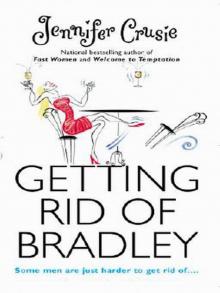 Getting Rid of Bradley
Getting Rid of Bradley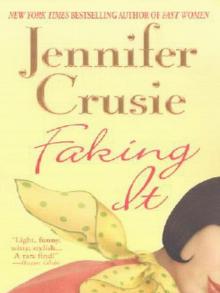 Faking It
Faking It Crazy People: The Crazy for You Stories
Crazy People: The Crazy for You Stories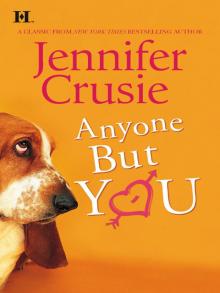 Anyone but You
Anyone but You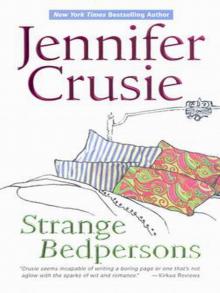 Strange Bedpersons
Strange Bedpersons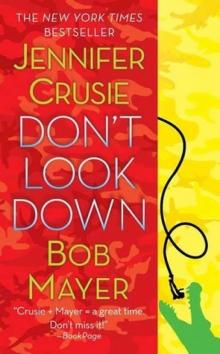 Don't Look Down
Don't Look Down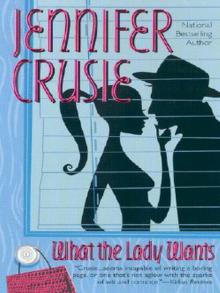 What the Lady Wants
What the Lady Wants The Cinderella Deal
The Cinderella Deal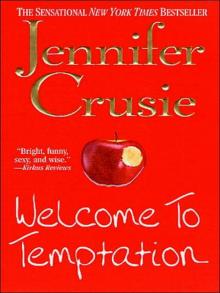 Welcome to Temptation
Welcome to Temptation Fast Women
Fast Women Hot Toy
Hot Toy Jennifer Crusie Bundle
Jennifer Crusie Bundle Bet Me
Bet Me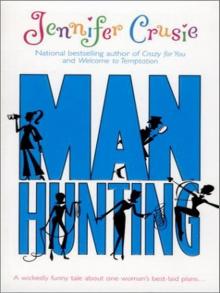 Manhunting
Manhunting Dogs and Goddesses
Dogs and Goddesses Charlie All Night
Charlie All Night Blogger Bundle Volume VIII: SBTB's Harlequins That Hooked You
Blogger Bundle Volume VIII: SBTB's Harlequins That Hooked You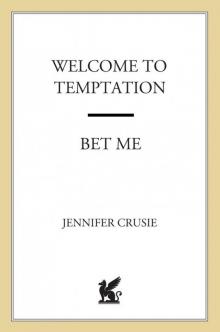 Welcome to Temptation/Bet Me
Welcome to Temptation/Bet Me It Must Be Christmas
It Must Be Christmas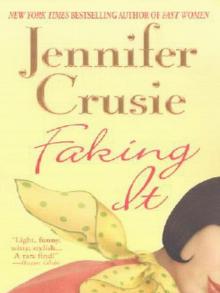 Faking It d-2
Faking It d-2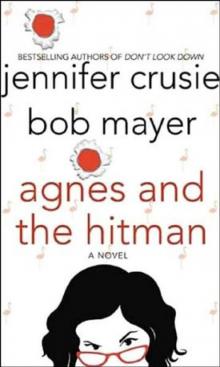 Agnes and the Hitman
Agnes and the Hitman The Unfortunate Miss Fortunes
The Unfortunate Miss Fortunes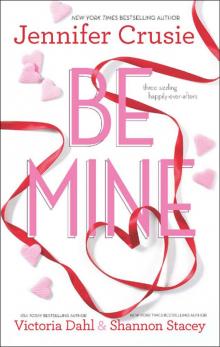 Be Mine
Be Mine